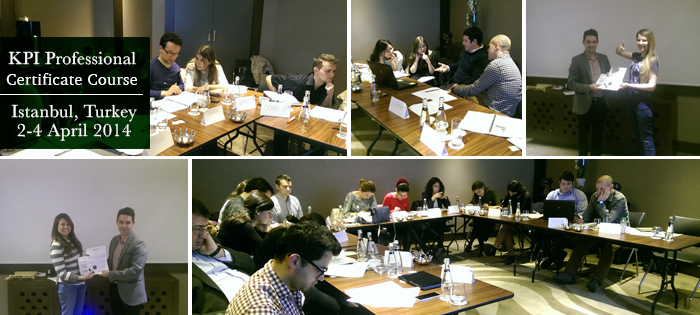The Certified KPI Professional Course in Istanbul was part of a series of certification courses dedicated to rigorous usage of KPIs in practice, organized in 2014 at global level in more than 30 cities from 5 continents, by The KPI Institute.
Facilitated by Adrian Brudan, Director of Research of The KPI Institute, the course was held in Istanbul, Turkey, between the 2nd and the 4th of April 2014.

The agenda for the Certified KPI Professional course covered in the first day the following subjects:
- Introduction to the world of KPIs;
- The pillars of KPI architecture;
- KPI selection;
The second day sessions covered the following discussion topics:
- KPI documentation;
- Data visualization – Designing KPI Dashboards and Scorecards;
- KPI data gathering and reporting;
In the third day of the course the next themes were approached:
- KPI management enablers: software, hardware, communication and culture;
- Generating value from using KPIs;
- Measuring and learning with KPIs.
In order to enable both the theoretical understanding and practical experience of using a variety of performance management tools and techniques for deploying KPIs correctly across different industries and functional areas, some of the methods used throughout the course were:
- Group discussions, exercises, simulations and case studies;
- Explanation of the theory regarding performance measurement;
- Presentation of the performance management templates as tools to support the integration of performance management practices in organizations;
- Customized feedback regarding the present use and the future plans for implementing performance management systems;
- Active involvement of all the participants in a collaborative learning environment where opinions and experiences are shared.
The course was attended by practitioners from Turkey, Georgia and Azerbaijan, having different areas of expertise in their working fields, like manufacturing, government administration and banking.
Before beginning the course, sharing challenges of previous experience in working with KPIs was encouraged and some of them were:
- Getting the buy in from employees in terms of performance management practices;
- Selecting relevant KPIs;
- Setting KPIs at individual level;
- Gathering data and KPI data visualization;
- Measurement and subjectivity in KPI assessment;
- KPI documentation;
- Implementing performance management processes.
When invited to express some learning needs, participants communicated the following expectations from the course:
- Gain a discipline understanding, including what are use case scenarios for KPIs, the trends and best practices in performance management;
- Discuss about KPI selection: identifying and defining relevant KPIs;
- Approach the topic of KPI documentation, with a focus on target setting, calculation formulas and standardization of performance practices;
- Learn about KPI monitoring and data visualization;
- Discuss about KPI activation, data gathering and analysis, in terms of techniques and tools;
- Reach the topic of decision making based on KPIs;
- Refer to deploying a culture based on performance and discuss about communication of performance;
- Gain a deeper understanding of the Balanced Scorecard by the discussing the arguments for implementation and the impact on planning at corporate and operational levels.
In addition to the training sessions, on the last day of the course, participants completed a certification test for obtaining the Certified KPI Professional status. The certification recognizes the professionals’ ability to deploy and use KPIs in accordance with The KPI Institute’s Key Performance Indicators Management Framework, the main body of knowledge on the rigorous use of KPIs in business.
Details about the KPI certification programs can be found on store.kpiinstitute.org.
If the opportunity of customized KPI training courses is of interest to you, email us at [email protected] and you will receive a tailored offer.
For more information contact one of our representatives:
Alexandru Muntean
[email protected]

